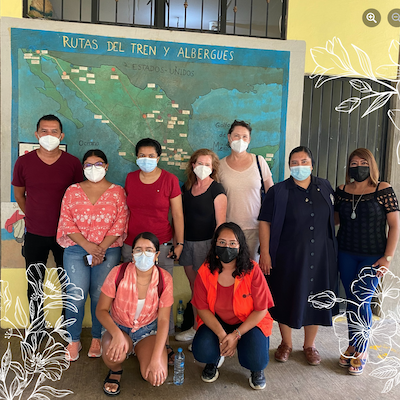 Delegates with staff at La72[/caption]
Delegates with staff at La72[/caption]
The heat was the first thing I noticed upon arrival in Tenosique, the location of La72, one of the largest shelters in the Franciscan Network on Migration, a Quixote Center partner. March to May are the hottest months, but in early June the heat was still oppressive, even without much humidity. Imagine walking miles every day in that heat.
My colleague Alexandra Gulden and I traveled last week to southern Mexico to experience the migrant trail and to visit Franciscan Network on Migration shelters. The idea was to encounter the stories of migrants working their way north, and to learn more about our partner's work and context so that Quixote Center can better accompany the Network and the migrants they serve.
On our second day we were driving in our air-conditioned van along the road that many migrants take, in the heat of the day, and encountered two young boys, no older than 11 or 12, obviously migrants. Without speaking, our driver rolled down his window and handed them his water bottle. How did they get there, and what would lead their parents to let them go? We will never know their particular stories, but we heard a few others.
There was the family from Honduras. They left with most of their extended family, totaling 20 people, because a young adult daughter was kidnapped by criminal gangs, and her husband and child went missing. The family filed a police report as well as a human rights report, and the result was that the gangs threatened to kill the entire family. The family then understood that the police and the gangs were working together. After receiving threats, the family made the painful decision to migrate, despite the fact that they had not found the missing daughter. They continue to be afraid that the Honduran gangs will find them in Mexico and kill them. For that reason, their hope is to make it into the US, where they believe they will be safe.
There was the group of five young women from Honduras and Guatemala who had found each other for mutual support in the shelter. Several had their kids with them; several had to leave their kids behind. Each story we heard was more shocking than the last. They told stories of horrific abuse by spouses and domestic partners; of kidnapping threats; of family members killed or disappeared; of fear for the lives of their children. They said there was no recourse with the police or legal system; they had filed reports and either the authorities did nothing or the threats intensified. We all cried together in that room as we experienced a small group of women giving each other the emotional support they needed to survive unspeakable trauma. They hope to make it into the United States, where they believe there is rule of law, and that people are held accountable for their crimes. They believe that in the US their children will be safe.
There was the elderly woman from Uganda whose husband and four brothers were killed. When she reported it, she received threats. She left Uganda for Ecuador with her daughter; they settled there for awhile and tried to make a living teaching English. She said they suffered racism and ended up on the streets. They were not able to survive in Ecuador and they decided to migrate farther north. She told a harrowing story of moving through the Darien Gap in Panama, a mountainous forest where there is no actual road, and notorious for its criminal gangs who extort migrants. They lost their money and their identification, slept outside in the forest, were held at gunpoint, were sexually assaulted; eventually, they succeeded in crossing into Central America. The daughter is a certified English teacher, and they hope to make it to the US, where they believe they will have a better life. Perhaps succumbing to realism, when we left they were applying for refugee status in Mexico.
The Mexican authorities told us that of the top countries of origin for migrants in Mexico, number 2 is Haiti and number 6 is Nicaragua. Quixote Center has sustainable development programming in both countries, designed to address the extreme poverty that helps to create the conditions of violence and poor governance that lead to migration. We complement the development programming by working to mitigate the negative impact that US foreign policies have on the ability of Haiti and Nicaragua to pull themselves out of poverty. Our work to accompany those who feel forced to leave their home countries completes our other program priorities. We hope that our work makes it possible for some families and communities to remain intact in their place of origin. For those who have to migrate, we work to contribute to an experience that promotes and upholds their dignity and leads to safety and security.
Future emails and blogs will talk more about this work. In the meantime, you can sign our petition to the Biden Administration demanding that they halt all deportations to Haiti.
And you can donate here.


